#chicken manure benefits
Explore tagged Tumblr posts
Text
Understanding NPK Analysis in Different Types of Manure: A Guide for Farmers
Manure is one of the most cost-effective and environmentally friendly fertilizers available to farmers. However, not all manure is created equal. Understanding the nutrient composition—commonly expressed as NPK (Nitrogen, Phosphorus, Potassium)—is crucial for optimizing crop yields and soil health. Here’s a detailed breakdown of the NPK analysis for common types of manure, along with…
#chicken manure benefits#composting manure#cow dung farming#crop-specific fertilizers.#farmers trend#farming best practices.#goat manure fertilizer#manure NPK analysis#manure types comparison#nitrogen-rich manure#organic farming techniques#organic fertilizers#phosphorus in manure#pig manure composting#potassium in manure#rabbit manure nutrients#sheep manure uses#soil fertility tips#sustainable farming#vegetable farming fertilizer
0 notes
Text
Fastest Composting Techniques for Efficient Waste Management
Composting is a natural process that converts organic materials into a nutrient-rich soil amendment through natural decomposition. It is an essential practice for gardeners and farmers who want to improve soil health and fertility. However, composting can take several months to a year to produce usable compost, which can be a challenge for those who need it quickly. Fortunately, there are…

View On WordPress
#composting#composting at home#composting benefits#composting bin#composting chicken manure#composting grass clippings#composting kitchen#composting lawn#composting leaves#composting manure#composting materials#composting soil#composting worms
0 notes
Note
So I'm trying to get a better understanding of what Veganism is all about, from an ethical standpoint. So, my Grandparents keep chickens pretty much as pets and will regularly give eggs away to family members because they have tons of them. And I'm just curious what the Vegan perspective on that situation is? Like is the main problem with the cruelty of industrial farming or is using animal products in general just blanketly considered bad?
Like I know Vegans do keep pets, so I just wonder what the perspective would be on using eggs or wool or milk or something from an animal that you care for as a pet? Like, if I decided to rescue a sheep an name them and give them a home with me as like another member of the family, would it be considered unethical to use their wool to make yarn for crochet or something like that? Is it different depending on the situation?
The core belief to keep in mind here is that we as vegans oppose the exploitation of animals for human benefit. For welfarists (who tend to be meat eaters or vegetarians) the main issue with animal products is the cruelty involved, whereas vegans tend to be abolitionists, who want to abolish animal agriculture rather than simply improve treatment.
This is relevant for discussing backyard eggs, because those eggs are the result of exploitation. The hens themselves have been exploited because they have been bred into bodies that vastly overproduce eggs to the extent that it comes with a myriad of health issues, they also usually come from hatcheries where male chicks are brutally slaughtered on mass. To then take what their bodies have spent resources to produce, and therefore profit from that situation, is further exploitation on top of that.
Vegans are generally okay with pets on the basis that they're adopted, and that we aren't exploiting them to serve our own interests. You can adopt hens, but the responsible thing to do is to prevent them laying using implants, except in the USA where this is not allowed. In that case, I personally would prefer chickens were allowed to benefit from their own production and those eggs are fed back to them, which restores some of the enormous amount of energy needed to create them. Excess eggs should then be donated to food banks, fed to other rescued animals or donated to vulnerable people rather than thrown away.
Milk is clearcut, since no animal produces milk without first being made pregnant. To keep a steady flow of milk you have to continuously impregnate them, and generally remove the calf so they aren't drinking it all. Dairy cows once again have been bred to overproduce so there may well be excess, but you really shouldn't be allowing pregnancy in the first place, so this is a moot point in terms of what to do with it.
With sheep it is a bit different, while sheep have been purposely bred to over-produce wool, wool is still an incidental part of keeping sheep, they need to be sheared and there is no real way for them to directly benefit from their own production. It is essentially a waste product at that point, like manure. Views differ on this, but I've no issue with a non-profit organisation selling wool on the basis that 100% of the funds generated go towards the care of the animals in question, which is practiced by many animal sanctuaries. Otherwise I think it is fine if someone donating the wool to an animal shelter for blankets, or turning it into warm clothing for the needy.
As a general rule, animals should be allowed to benefit from what they produce, rather than us. In cases where they can't directly benefit, we certainly shouldn't seek to profit from them. The power dynamic between humans and non-human animals, between pet and owner, will always be imbalanced and to materially benefit from that relationship is taking advantage of that power for personal gain. As soon as you're personally profiting from an animal's body, you also have a vested interest in continuing to make sure the animal continues to produce whatever you are profiting from, opening the door to further exploitation or even abuse.
Things like eggs from pet chickens or wool from a rescued sheep certainly aren't the biggest animal rights issues on our radar, but thinking about it in an ethically consistent fashion means that we apply the same values to these situations as we would any human use of non-human animals. Animals do not exist to serve our interests, and we should respect their bodily autonomy in every way that is possible and practicable. In short, we just shouldn't be looking for ways to benefit from our relationships with animals.
51 notes
·
View notes
Note
what do you know about pigeons
Been thinking a lot about intentional erecting of dovecotes as a means of pigeon population control, recently. It’s very funny to me, though I suppose that’s not really the right word, that the best way to control pigeons as pests is to care for them. I guess that’s what you get with domestic animals. Their droppings are problematic because they do not have a sufficient diet (and those droppings are therefore liquid, as opposed to a healthy dropping that is a neat and easy-enough-to-sweep-up ball) and generally localized to under their perches (and as originally cliff-dwelling birds, buildings are the next best). So if they are provided access to grains, localized to singular locations that also provide shelter that-is-not-buildings that also gives people access to them to swap out fertilized eggs that would be making more pigeons with fakes that will not. I guess the most comprehensive attempt at this was in Germany, but I have seen things around that various Czech cities are pushing for it. I’d be interested to see a cost breakdown of dovecote construction and ongoing maintenance and feed costs, and any levels of damage-by-pigeon, ongoing cleaning and such of areas infested by pigeons that they still deal with and such compared to more traditional methods of culling and repellent, and any cleaning and such as well.
Also also also! This also provides good access to those pigeon droppings, that make excellent fertilizer. I haven’t read about that as much as I’d like to, I mostly just throw my pigeons’ waste in my compost and let it do its thing, but one interesting point of interest I’ve seen lately is that, while they are highly nitrogen rich like chicken and other poultry droppings, they apparently release that nitrogen at a much slower rate than these others. I haven’t read any proper sources on some of this, like its exact nutrient makeup and how it compares exactly to other forms of manure practically speaking, so that’s probably on my list of things to do at some point. It’s certainly one of the significant historical benefits of dovecotes, but I imagine part of that is as much the practicality of gathering a localized source of manure (and meat, while they were at it) that you didn’t necessarily have to provide feed for.
#sorry for taking 40 years to answer this#a very It's Not You It's Me sort of problem#was very excited to get it but then i overthink everything and take 40 years to deal with those things
23 notes
·
View notes
Video
youtube
🌴 Ready to give your palm tree a powerful nutrient boost? 🚀 Chicken manure is one of the best organic fertilizers you can use! In this video, we’ll cover the benefits, best time to fertilize, and the right way to apply it for healthy, thriving palm trees.
#youtube#youtube video#youtube views#video#videos#palm trees#container gardening#chickenmanure#fertilizer#organicgardener#organicfertilizer#gardenblr#gardencore#gardening#gardeningtips#houseplants#plant#plantscare#plantcare#howtovideo
2 notes
·
View notes
Text
A Comprehensive Guide to Making Composed Fertilizer
Fertilizers play a crucial role in agriculture, gardening, and landscaping by enhancing soil fertility and promoting plant growth. While synthetic fertilizers are widely used, their environmental impacts and cost have led many to explore more sustainable options. Composed fertilizer, often made from organic waste, offers an eco-friendly alternative that enriches soil health while reducing waste. In this detailed guide, we will explore everything you need to know about making composed fertilizer, from the materials required to the step-by-step process and tips for successful composting.
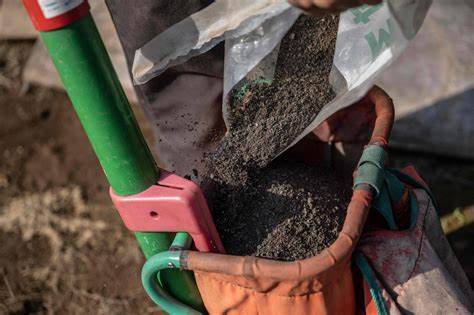
What Is Composed Fertilizer?
Composed fertilizer, commonly referred to as compost, is a nutrient-rich material created through the natural decomposition of organic matter. It serves as a soil conditioner, enriching it with essential nutrients like nitrogen, phosphorus, and potassium, while also improving its structure and water retention capabilities.
The process of composting involves the breakdown of organic waste by microorganisms such as bacteria and fungi under controlled conditions. The resulting compost can be used in gardens, farms, and landscapes to promote healthier plants and sustainable agricultural practices.
Benefits of Composed Fertilizer
Before diving into the process of making compost, let’s understand the key benefits it offers:
Nutrient Enrichment: Compost contains vital nutrients that support plant growth.
Soil Improvement: It enhances soil structure, promoting better aeration and water retention.
Waste Reduction: Composting reduces the amount of organic waste sent to landfills.
Eco-Friendly: Unlike synthetic fertilizers, compost does not harm the environment or contribute to water pollution.
Cost-Effective: Making your own compost saves money on store-bought fertilizers.
Supports Biodiversity: Composting fosters beneficial microorganisms that contribute to soil health.
Materials Needed for Composing Fertilizer
Creating a balanced compost requires a mix of two primary components: greens and browns. These materials provide the nitrogen and carbon needed for decomposition.
Greens (Nitrogen-Rich Materials)
Fruit and vegetable scraps
Coffee grounds and tea leaves
Grass clippings
Fresh garden waste
Manure (from herbivores like cows, horses, or chickens)
Browns (Carbon-Rich Materials)
Dry leaves
Straw or hay
Shredded paper or cardboard
Wood chips and sawdust
Corn stalks
Other Essential Materials
Water: To maintain the right moisture level.
Air: For aeration to support microbial activity.
Compost Bin or Pile: A designated space to collect and manage the composting process.
Step-by-Step Process for Making Composed Fertilizer
Creating composed fertilizer involves several stages, from gathering materials to the final product. Follow these steps to ensure a successful composting process:
1. Choose a Composting Method
There are several methods to compost organic waste. Select one that suits your needs and available resources:
Hot Composting: Requires frequent turning and produces compost quickly (4-8 weeks).
Cold Composting: A slower method (6-12 months) with less maintenance.
Vermicomposting: Uses worms to decompose organic matter, ideal for small-scale composting.
2. Set Up Your Composting Area
Location: Choose a well-drained spot with partial shade.
Bin or Pile: Use a compost bin, tumbler, or create a simple open pile.
3. Collect and Prepare Materials
Chop large items like branches or vegetable scraps into smaller pieces to speed up decomposition.
Mix greens and browns in a ratio of approximately 1:2 for optimal results.
4. Build the Compost Pile
Layer the materials as follows:
Start with a layer of coarse browns like wood chips for aeration.
Add a layer of greens.
Alternate layers of greens and browns, moistening each layer lightly with water.
5. Monitor and Maintain the Pile
Moisture: The pile should be as damp as a wrung-out sponge. Add water if it’s too dry or browns if it’s too wet.
Aeration: Turn the pile every 1-2 weeks to provide oxygen and speed up decomposition.
Temperature: Use a compost thermometer to ensure the pile reaches 135-160°F (57-71°C) for effective decomposition and pathogen elimination.
6. Decomposition Process
Microorganisms will break down the materials over time. You may notice heat, steam, or a slight earthy smell as the pile matures.
7. Harvest the Compost
After 2-6 months (depending on the method used), the compost will be ready when it is dark, crumbly, and has an earthy smell. Sift out any undecomposed materials to add back into a new batch.
Common Composting Mistakes to Avoid
Imbalance of Greens and Browns: Too much of one can lead to slow decomposition or unpleasant odors.
Overwatering: Excess moisture can cause anaerobic conditions, leading to a foul smell.
Underaeration: Lack of oxygen slows down decomposition and causes a compacted pile.
Adding Non-Compostable Items: Avoid meat, dairy, oily foods, or pet waste, which can attract pests or create harmful bacteria.
Tips for Successful Composting
Shred Larger Items: Smaller pieces decompose faster.
Maintain the Right Ratio: Aim for a balanced mix of greens and browns.
Turn the Pile Regularly: This ensures even decomposition and aeration.
Monitor Odor: A healthy compost pile smells earthy, not foul.
Protect Against Pests: Cover food scraps with a layer of browns or use a secured bin.
Applications of Composed Fertilizer
Composed fertilizer has numerous applications across different fields:
Gardening: Mix compost into garden beds to enrich soil.
Lawns: Spread a thin layer over your lawn to improve soil health and grass growth.
Agriculture: Use compost to enhance crop yields sustainably.
Potting Soil: Combine compost with other materials for nutrient-rich potting mixes.
Erosion Control: Compost helps retain soil and prevent erosion in landscaping projects.
Environmental Impact of Composting
Composting has significant positive effects on the environment:
Reduces greenhouse gas emissions by diverting organic waste from landfills.
Promotes sustainable agriculture by reducing reliance on synthetic fertilizers.
Enhances soil health, leading to better water retention and reduced runoff.
Conclusion
Making composed fertilizer is a rewarding process that benefits both the environment and your plants. By recycling organic waste into nutrient-rich compost, you can reduce your environmental footprint, save money, and promote sustainable practices. Whether you’re a home gardener or a farmer, composting is an essential skill that contributes to a healthier planet and more productive soil.
Start your composting journey today and experience the transformative power of composed fertilizer. With patience and the right techniques, you’ll create a sustainable resource that supports thriving plants and ecosystems for years to come. Brian Chapman Portadown
2 notes
·
View notes
Text
One of my favorite Earthlings, Muu, is demonstrating what we mean by "utilizing animals' natural behaviors to our mutual benefit." He wants to root up and eat blackberry root balls and doesn't particularly care about where he does so as long as his other needs are being met. We just make sure that he's doing so in a place where we need to get rid of them.
We have a few places on our land where previous occupants just threw their trash bags into the brush. We're using our remaining chickens to scratch as much of it out of the dirt and grass as they can so it's much easier for us to pick up. They also help control insect populations, and to a lesser extent mice, too.
Our ducks do much the same things, though they don't scratch so much as root, but they also turn their pond water into a good liquid fertilizer that can be used immediately. Chicken manure needs to be aged for a while first. The ducks' used bedding provides a good enriched mulch that also doesn't have to age before use. Plus, they're just a lot of fun to watch.
Our geese graze (and maybe we'll get a few sheep someday) so they'd be more appropriate for things like orchard "mowing." I have some bat houses to put up and I'll be adding guano catching basins beneath them for a supply of gardening phosphorus. The bats will also help control the mosquito population.
Now that your eyes are thoroughly glazed over I'll just say that I'm sure you got the picture a couple of paragraphs ago. Anyway, here's one of my favorite Earthlings doing what he loves, not knowing or even caring how much his normal daily life contributes to the quality of the orchard and garden trim that he gets as treats. He's just contentedly munching blackberry roots in the plum tree's shade.
2 notes
·
View notes
Text
Innovative practice of chicken manure organic fertilizer production line
The innovation practice of chicken manure organic fertilizer production line has made remarkable progress in recent years, through technological innovation and process optimization, the efficient treatment and resource utilization of chicken manure has been realized, and new vitality has been injected into the development of agricultural recycling. The following are the main innovative practices of the current chicken manure organic fertilizer production line:
1. Intelligent and automatic control: Through the Internet of Things technology, the chicken manure organic fertilizer production line realizes the real-time monitoring and remote operation of the fermentation process.
2. Automated production line: Modern chicken manure organic fertilizer production line adopts automated equipment, such as belt conveyor, disc granulator, dryer, etc., which reduces manual intervention and improves production efficiency.
3. Process optimization and product innovation: Secondary fermentation process is adopted, with a variety of strains undergoing primary fermentation first, and then adding strains that fix nitrogen, dissolving phosphorus and activating potassium for secondary fermentation, which significantly improves the nutrient content and fertilizer efficiency of organic fertilizer.
4. Economic and social benefits cost reduction and income improvement: The application of new fermentation technology and automation equipment has significantly reduced production costs and improved production efficiency.
5. Environmental protection and sustainable development of agriculture: organic fertilizer production line of chicken manure not only solves the environmental problems of chicken manure treatment, but also provides high-quality fertilizer for agricultural production and promotes the development of agricultural circular economy.
Through these innovative practices, the chicken manure organic fertilizer production line not only improves production efficiency and product quality, but also provides new solutions for the resource utilization of agricultural waste, and promotes the development of green agriculture.

0 notes
Text
What is the degree of automation of cow manure organic fertilizer equipment
The degree of automation of cow manure organic fertilizer equipment has been significantly improved in recent years, mainly reflected in the following aspects:
1. Automatic control of fermentation process: modern cattle manure organic fertilizer equipment, especially fermenters, are equipped with advanced automatic control systems. These systems use sensors to monitor key parameters such as temperature, humidity and oxygen concentration in real time, ensuring that the fermentation process is always at its best.
2. Remote monitoring and operation: Some cow manure organic fertilizer equipment supports remote monitoring and operation, real-time viewing of equipment operating status, and remote control. This remote control function not only improves the convenience of operation, but also reduces manual intervention and reduces labor intensity.
3. Intelligent material handling: The equipment also realizes a high degree of automation in material handling. In addition, some units are equipped with automatic dosing systems that automatically add excipients and strains according to preset formulations.
4. Energy saving and environmental protection design: The improvement of automation not only improves the production efficiency of organic fertilizer production lines, but also brings energy saving and environmental protection benefits.
5. Versatility and flexibility: cow manure organic fertilizer equipment is not only suitable for cow manure treatment, but also for other agricultural waste, such as chicken manure, pig manure, straw, etc. This versatility makes the device more adaptable and economical in different scenarios.
6. Easy maintenance and operation of equipment: automated equipment is usually equipped with intelligent diagnostic system, which can monitor the operating status of equipment in real time, and discover and warn potential faults in time. This intelligent maintenance function reduces equipment downtime and reduces maintenance costs.

0 notes
Text
There is a reason for the rise of chicken manure organic fertilizer equipment
The rise of chicken manure organic fertilizer equipment mainly has the following reasons:
1. Promotion of environmental protection policies: With the enhancement of environmental protection awareness and the strictness of policies and regulations, the government has issued a series of policies to support the utilization of agricultural waste resources.
2. The development of organic agriculture: The increasing demand of consumers for organic food has promoted the rapid development of organic agriculture.
3. Sustainability of agricultural production: modern agriculture has an increasing demand for environmental protection and sustainable development, and chicken manure organic fertilizer equipment can convert waste into high value-added fertilizers, which is in line with the trend of green agricultural transformation.
4. Equipment performance improvement: In recent years, chicken manure organic fertilizer equipment has made significant progress in treatment efficiency, energy consumption reduction and intelligent control.
5. Diversified product demand: With the diversification of market demand for organic fertilizer forms, equipment manufacturers continue to optimize products, such as granular organic fertilizer because of convenient storage and application, market share is growing rapidly.
6. Significant economic and social benefits: chicken manure organic fertilizer equipment can efficiently treat chicken manure, reduce waste disposal costs, and reduce environmental pollution risks.
7. Resource recycling: Organic fertilizer production line realizes the resource utilization of waste by converting chicken manure into organic fertilizer, and improves the economic benefits of agricultural production.
In summary, the rise of chicken manure manure equipment is the result of environmental protection policies, market demand, technological progress and economic effects, which is of great significance in promoting the utilization of agricultural waste resources and sustainable development of agriculture.
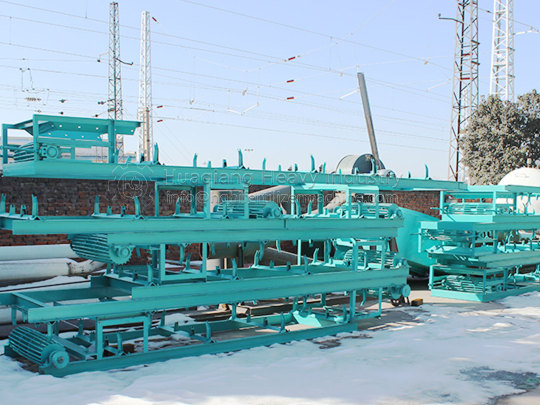
0 notes
Text
The price of chicken manure organic fertilizer equipment varies depending on factors such as equipment type, scale, function, and manufacturer, so it is difficult to give an exact unified price. However, based on publicly released information, we can roughly understand the price range of chicken manure organic fertilizer equipment. Generally speaking, the price of chicken manure organic fertilizer equipment ranges from several thousand yuan to hundreds of thousands of yuan. Here are some specific examples and price ranges: Small equipment: such as small manure processing fertilizer machinery, small granular fertilizer processing machines, etc., the price may be around several thousand yuan to ten thousand yuan. Medium-sized equipment: These organic fertilizer equipment usually have higher production efficiency and a wider range of functions, and the price will increase accordingly. Large equipment: For large-scale organic fertilizer production line equipment with an annual output of more than 10,000 tons, the price may be as high as hundreds of thousands of yuan or even higher. These equipment usually include a series of supporting facilities such as dryers, fermentation tanks, granulators, etc., which can realize the full automation of production from raw material processing to finished product packaging.
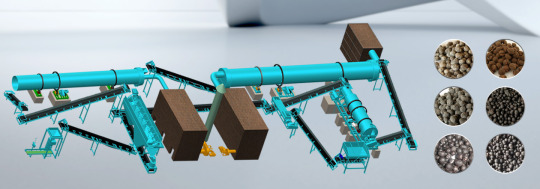
The actual price may change due to market supply and demand, equipment quality, manufacturers, after-sales service and other factors. Therefore, when purchasing chicken manure organic fertilizer equipment, it is recommended that users choose according to their actual needs and budget, and consult multiple suppliers to obtain more detailed price information and product comparisons. In addition, when purchasing chicken manure organic fertilizer equipment, users should also pay attention to the performance parameters, production efficiency, energy consumption indicators and other aspects of the equipment to ensure that the purchased organic fertilizer equipment can meet their production needs and achieve the expected economic benefits.
0 notes
Text
With the rapid development of livestock and poultry farming, a large amount of manure and sewage has been generated. The harmful elements in these manures are seriously exceeded, and it is difficult to treat them by traditional methods of returning to the field. In response to this situation, people have developed an organic fertilizer production line with a mobile and efficient solid-liquid separation technology as the core, integrating supporting high-efficiency mixers, turners, granulators and other fertilizer production equipment. The development and research of livestock and poultry manure organic fertilizer production line and sterilization system will be conducive to promoting the formation of a production industry chain of harmless treatment, resource utilization, and commercial operation of livestock and poultry manure, achieving the goals of industrialization, marketization, and large-scale production, and effectively promoting the development of ecological agriculture and circular economy in the city.
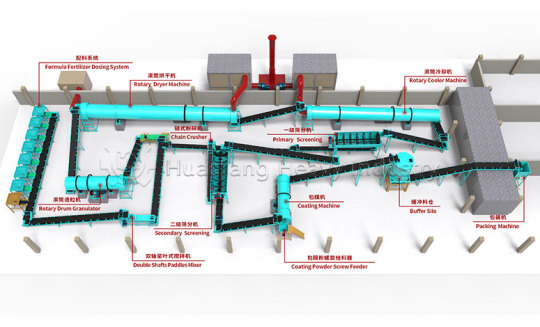
Organic fertilizer equipment is a kind of equipment that uses chicken and pig manure as the main raw material, adds a certain amount of nitrogen fertilizer, phosphate fertilizer, potassium fertilizer, magnesium sulfate, ferrous sulfate and other substances, and ferments rice bran, yeast, soybean meal and sugar for a certain period of time as biological bacteria, and mixes and ferments under the action of sulfuric acid to produce biofertilizer. It has not only created economic benefits for enterprises, but also made great contributions to human environmental protection projects. Organic fertilizer production line includes many organic fertilizer equipment, which is a very important agricultural production machinery. If you are also interested in organic fertilizer production line, please call Huaqiang Heavy Industry for consultation.
0 notes
Text
Step-by-Step Guide How to Set Up a Successful Layer Poultry Farm
For many people fascinated by the poultry farming business, layer poultry farming catches their attention. It is because layer poultry farming provides a steady income if you become successful at it. So, if you are one among them, you aren't alone. However, how to set up a successful layer poultry farm? This involves an effort as significant as any other business. But with this step-by-step guide from Gartech Equipments, one of the leading poultry equipment manufacturers in India, your journey can become much easier.

What is Poultry Layer Farming?
Poultry layer farming is done with the fundamental purpose of raising layer hens for egg production. This is unlike broiler farming, where the basic aim is meat production. Layer hens typically begin hatching eggs at approximately 18-20 weeks of age and can continue doing so until they are 70-72 weeks old. However, factors like breed and management practices matter when it comes to their egg-laying lifespan. Accordingly, poultry layer farming demands meticulous planning, which includes selecting the right breed, ensuring proper housing, and keeping the birds in excellent health to increase their productivity.

Benefits of Poultry Farm Layer
Poultry layer farming is a popular business within the poultry realm. It is for obvious reasons that include the following.
Steady Income:
Poultry layer farming focuses on eggs, which form the staple food of millions of people. Thus, daily egg production provides steady income to farmers who can sell the eggs to various vendors across the market. Besides, the investment is higher than broiler farming, which focuses on meat production and earning quick profits.
Cost-Effective:
While providing steady income, poultry layer farming also proves cost-effective as these hens require less feed than their broiler counterparts. Additionally, since the productive lifespan (up to 72 to 80 weeks) is high, farmers can enjoy continuous returns in the long run.

Sustainability:
Wondering how poultry layer farming can be sustainable? Well, this type of poultry farming can involve tactics and techniques that enable optimal resource utilization with minimal waste. On the other hand, you can use chicken manure as an organic fertilizer, minimizing waste, and helping improve soil health.
Higher Feed Conversion Efficiency:
Layers are more efficient at converting feed into eggs. Hence, they are more economically and commercially beneficial than meat-producing birds. Now, you must be thinking about how you can optimize these benefits. Of course, the answer is by making the effort to set up a layer poultry farm. Here are the steps to do it.
Set Up Your Layer Poultry Farm with These 7 Easy Steps!
Here's how you can enter the world of layer poultry farming.
1. Research and Planning
Research is fundamental and essential for every business, including layer poultry farming. So, begin with understanding the market demand, the business's regulations, and the environmental conditions in your region. Accounting for these factors will help you identify the scale of your business, the investment required, and the revenue you may generate from it. Accordingly, prepare a commercial business plan or project report to set the roadmap for your venture and try to get financial help if you need it. The report or plan should include every detail, including the initial investment, expected profits, risks, strategies, and routine operational plan.

2. Gather the Capital You Need
The capital you need to start your own poultry layer farm differs depending on the scale of your business and the cost of resources in your region. For instance, for a beginner in the layer poultry business, the smallest farm capacity can range from 5,000 to 15,000 birds, with a project cost of approximately Rs. 35 lakhs to Rs. 80 lakhs. The capital required for starting a poultry farming business varies by scale. If you do not have adequate funds for your venture, you can explore government funding schemes like PM SVANidhi, which offers microloans. In addition, you can opt for small business loans with lower interest rates and various subsidies offered by different states all over India. Another alternative is that of crowdfunding. Asking for support from family and friends can also help you gather a significant amount of capital.
3. Poultry Setup:
Setting up the actual farm involves building the shed with proper housing to maintain the health and productivity of the layer hens. As for housing systems for commercial layers, you can usually include different types of cage systems. Here's more about these options.
A California-Type Cage: It is a traditional poultry cage system used in layer farming. It consists of cages mounted on an A-shaped frame, allowing manure to fall freely onto the ground beneath the cages. Hence, they require high-raised platforms for proper functionality. Typically, these cages are used in open housing systems with natural ventilation. However, since the manure accumulates beneath the cages continuously, this system tends to be less hygienic and poses a higher risk of disease. These cages are available from 2 to 4 tiers and are preferred for farms with a capacity of 5,000 to 25,000 or 30,000 birds per house.
H frame multi-tier vertical cage system: Modern H-Type multi-tier battery cages have gradually replaced California cage systems due to their limitations. These advanced systems, available in 3 to 8 or even 10 tiers, offer significantly higher housing capacity within the same space. Additionally, they provide better hygiene, enhanced automation, and improved efficiency, making them the preferred choice for commercial poultry farming. The H-frame multi-tier cage system is ideal for intensive and super-intensive farming, with capacities ranging from 30,000 to 80,000 or more birds.
In addition to housing, ensure your poultry layer farm is adequately ventilated, and has temperature control systems. Besides, the birds must have access to clean water and feed. Ensuring proper lighting to foster consistent egg production with approximately 15 hours of light daily is also important.
4. Select Premium Layer Chicks
Connect with a reputable hatchery to buy healthy day-old layer chicks. Some best breeds in this regard include Hy-Line, White Leghorn, and Plymouth Rock.
5. Ensure Proper Nutrition
Diet quality and schedule are crucial for successful poultry layer farming. It involves,
Starter feed (0-6 weeks) for chick growth
Grower feed (6-18 weeks) for development
Layer feed (18 weeks onward) enriched with calcium and protein for egg-laying
6. Health Management
Bird health is critical to productivity and profitability. Some good practices include creating a vaccination schedule, conducting regular health checks, maintaining poultry hygiene, and restricting farm visitors to reduce contamination.
7. Egg Collection and Storage
Some steps include; providing nesting boxes, collecting eggs twice a day to prevent breakage, storing eggs in a cool and dry place, and using graded packing. In addition to the above, marketing your produce and selling it in a timely manner also matters. You must grow your network by connecting with local markets, grocery stores, online delivery stores, supermarkets, wholesalers, etc.
How Can Gartech Equipments Contribute to Your Success?
Gartech Equipments encourages new poultry entrepreneurs with its premium poultry farming equipment. Our equipment, which includes brooder cages, breeder cages, layer, egg collection systems, etc. feature the most advanced technology, premium materials for durability, and excellent after-sales support. All our products are known for their durability, efficiency and capabilities to ensure poultry efficiency, longevity, and productivity. Prepared to embark on your journey to a successful poultry business? Email us at [email protected] to explore more about our support
0 notes
Note
Hello Acti-veg! Im a big fan of ur blog. Ik ur no Vegan prophet/guru or anything, but i could really use another vegan to talk to. I'm vegan and also I have been trying to live as low waste a lifestyle as possible. Growing my own food included. My mom, despite my best efforts, refuses to go vegan. In fact she is a staunch Anti-vegan. Her doctor told her to go plant-based, her health is failing bc of her diet, and refused to change. But she's a stubborn until proven wrong type.
She made a huge fuss about how useless growing our own food was, but through ignoring her and making an effort, and successfully harvesting, I convinced her that growing food was a good idea, and have slowIy started including more vegetables and water into her diet. She expressed interest in backyard hen keeping. I always wanted to adopt rescue chickens, I could give them a good life, spay them so they dont have to be egg machines, and the manure/ free roaming habits for eating bugs could help around the garden and give them enrichment, and I briefly considered the option. But I know that Veganism is about harm reduction, condemning, and reducing the reliance on animal exploitation as far as possible of Human and Non-human animals.
I thought that by eating yard eggs as opposed to grocery store eggs I could explain the conditions of factory farm animals, and then teach her about the impact it causes on animals even locally, and then spay the hens properly. But it still feels shitty on the end of the hens..
I feel like by trying to get my mom to slowly transition to veganism full stop, I would be making non-vegan decisions along the way, but if I do nothing, I would have wasted the opportunity to make another activist and save more animals in the longterm, i was wondering what ur thoughts on it may be? Or anyone in the comments
I can totally appreciate the dilemma here, but honestly I think you may be taking on the responsibility of her choices a little too much. I could be wrong, but it sounds like you're taking her failure to reduce her harm as a personal failure, and therefore determining that it's up to you to directly change her behaviour.
I think that is probably how you have arrived at this dilemma - you are wanting to reduce her harm to the extent that you're willing to put yourself through something you'd not only find uncomfortable, but would actively go against your own ethics. You can advocate, you can provide opportunities for her to do better, but it's really not up to you to provide her with less harmful animal products.
Besides, I think it's an assumption that her having backyard hens would be more likely to lead her to veganism - in my experience, welfarism is not on the same continuum as abolitionism, one doesn't lead to the other. She will still think of animals as essentially there to provide things for her benefit, she will just also think they should be treated well while doing so, which she probably already believes.
I share that impulse to try to help those around you see the truth you have arrived at, and to some extent that is our duty as vegans and activists. However, you can't take on the burden of their choices as your own, and you shouldn't compromise your own principles to lessen someone else's harm.
Personally I'd take a third option - tell her you'd like backyard hens too, you think it'd be great to save some battery hens, but you'll be looking after their health by preventing them from laying, because that is the responsible thing to do given the health impact. You coul still educate her if she chooses to go down this route. See where she lands on that, but either way, I really don't think it's on you to try to make the animal products she consumes more ethical - that way you really would be making her choices your own.
If you'd like to chat this through more with another vegan then please feel free to message me - my inbox is always open.
16 notes
·
View notes
Text
Poultry Layer Farming Business: A Comprehensive Guide to Starting Your Own Layer Chicken Farming Venture
Poultry Layer Farming Business

Poultry layer farming is one of the most lucrative and sustainable agribusiness ventures today. With the increasing demand for eggs and poultry products, layer farming has become a popular choice for entrepreneurs and farmers looking to generate steady income. This blog will provide a detailed overview of poultry layer farming, including its benefits, requirements, and a step-by-step guide to starting your own layer farming business. Additionally, we’ll discuss the key components of a poultry layer farming project report to help you plan and execute your venture successfully.
What is Poultry Layer Farming?
Poultry layer farming refers to the raising of egg-laying chickens (layers) for commercial egg production. Unlike broiler farming, which focuses on meat production, layer farming is dedicated to producing eggs for human consumption. Layer chickens are specifically bred for their high egg-laying capacity, and they typically start laying eggs at around 18-20 weeks of age, continuing for about 12-14 months.
The global demand for eggs is on the rise due to their nutritional value, affordability, and versatility in cooking. This makes layer farming a profitable and sustainable business opportunity for both small-scale and large-scale farmers.
Benefits of Poultry Layer Farming
High Demand for Eggs: Eggs are a staple food in many households, and their demand remains consistent throughout the year.
Steady Income: Layer farming provides a regular source of income as hens lay eggs daily.
Low Initial Investment: Compared to other livestock businesses, layer farming requires relatively low startup costs.
Quick Returns: Hens start laying eggs within 5-6 months, allowing farmers to recover their investment quickly.
By-Products: Poultry manure can be sold as organic fertilizer, providing an additional revenue stream.
Scalability: Layer farming can be started on a small scale and expanded gradually based on market demand and available resources.
Key Requirements for Starting a Poultry Layer Farming Business
Before diving into layer farming, it’s essential to understand the basic requirements and infrastructure needed to ensure success.
1. Land and Housing
Adequate space is required for constructing poultry sheds. The housing should be well-ventilated, secure, and designed to protect the birds from predators and extreme weather conditions.
Each bird requires about 2-3 square feet of space in the shed.
2. Layer Chickens
Choose high-quality layer breeds such as Hy-Line, Bovans, or Lohmann, which are known for their high egg production.
Purchase day-old chicks or ready-to-lay pullets from reputable hatcheries.
3. Feed and Nutrition
Layer chickens require a balanced diet rich in protein, vitamins, and minerals to ensure optimal egg production.
Commercial layer feed is available in the market, but you can also prepare feed using locally available ingredients like maize, soybean, and fishmeal.
4. Water Supply
Clean and fresh water must be available at all times. Automatic waterers can help maintain a consistent water supply.
5. Vaccination and Healthcare
Vaccinate the birds against common diseases like Newcastle disease, avian influenza, and fowl pox.
Regular health check-ups and proper hygiene practices are essential to prevent disease outbreaks.
6. Lighting
Adequate lighting is crucial for stimulating egg production. Provide 14-16 hours of light per day using artificial lighting if necessary.
7. Marketing and Sales
Identify potential buyers, such as local markets, supermarkets, and egg processing companies.
Build a strong distribution network to ensure timely delivery of eggs.
Step-by-Step Guide to Starting a Poultry Layer Farming Business
Step 1: Conduct Market Research
Analyze the demand for eggs in your area and identify potential competitors.
Understand the pricing and preferences of your target customers.
Step 2: Develop a Business Plan
Outline your goals, budget, and operational plan.
Include details about housing, feed, healthcare, and marketing strategies.
Step 3: Set Up the Infrastructure
Construct poultry sheds and install necessary equipment like feeders, waterers, and lighting systems.
Ensure proper ventilation and waste management systems are in place.
Step 4: Purchase Layer Chickens
Buy high-quality chicks or pullets from a trusted supplier.
Start with a small number of birds to minimize risk and gain experience.
Step 5: Provide Proper Care and Management
Monitor the birds’ health and growth regularly.
Maintain a clean and hygienic environment to prevent diseases.
Step 6: Start Egg Production
Once the hens start laying eggs, collect them daily and store them in a cool, dry place.
Grade and package the eggs according to size and quality.
Step 7: Market and Sell Your Eggs
Promote your eggs through local markets, social media, and word-of-mouth.
Offer competitive pricing and ensure consistent supply to build customer loyalty.
Poultry Layer Farming Project Report
A well-prepared project report is essential for securing funding and planning your layer farming business. Here are the key components to include:
Executive Summary: A brief overview of the project, including objectives, location, and expected outcomes.
Market Analysis: Details about the demand for eggs, target customers, and competition.
Technical Details: Information about housing, equipment, and farming practices.
Financial Plan: Estimated costs for infrastructure, chicks, feed, and other expenses, along with projected revenue and profit margins.
Risk Analysis: Potential challenges and mitigation strategies.
Implementation Plan: A timeline for setting up and operating the farm.
Challenges in Poultry Layer Farming
While layer farming is profitable, it comes with its own set of challenges:
Disease Outbreaks: Proper vaccination and biosecurity measures are essential to prevent diseases.
Feed Costs: Fluctuations in feed prices can impact profitability.
Market Competition: Differentiating your product through quality and branding is crucial.
Climate Sensitivity: Extreme weather conditions can affect egg production.
Conclusion
Poultry layer farming is a rewarding business opportunity that offers steady income and scalability. With proper planning, management, and dedication, you can build a successful layer farming venture. By understanding the requirements, challenges, and market dynamics, you can create a sustainable business that meets the growing demand for eggs. Whether you’re a beginner or an experienced farmer, layer farming is a viable option to explore in the agribusiness sector.
Start small, learn the ropes, and gradually expand your operations to maximize profits. With the right approach, your poultry layer farming business can thrive and contribute to the ever-growing poultry industry.
0 notes
Text
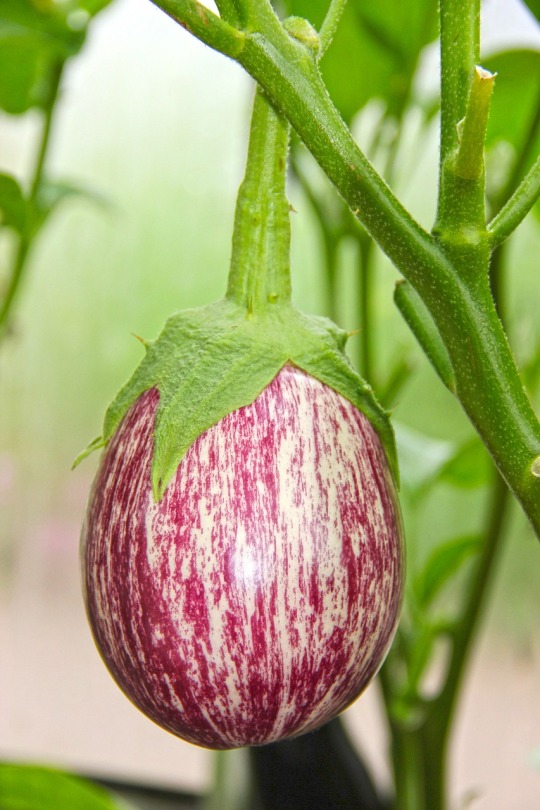
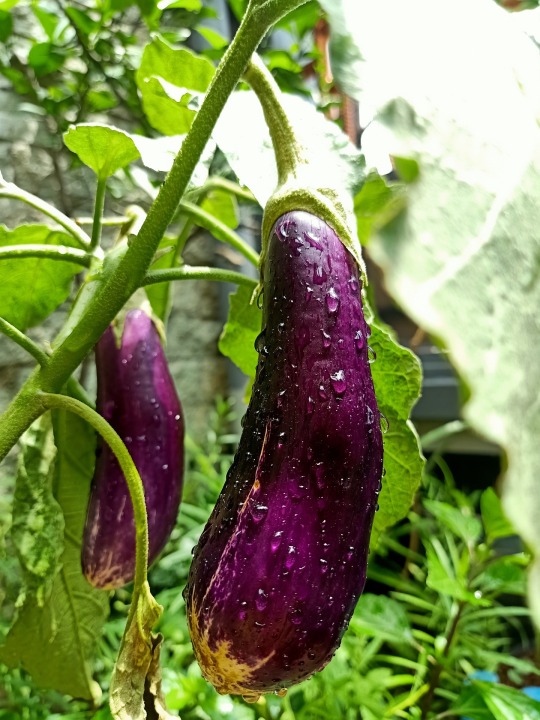
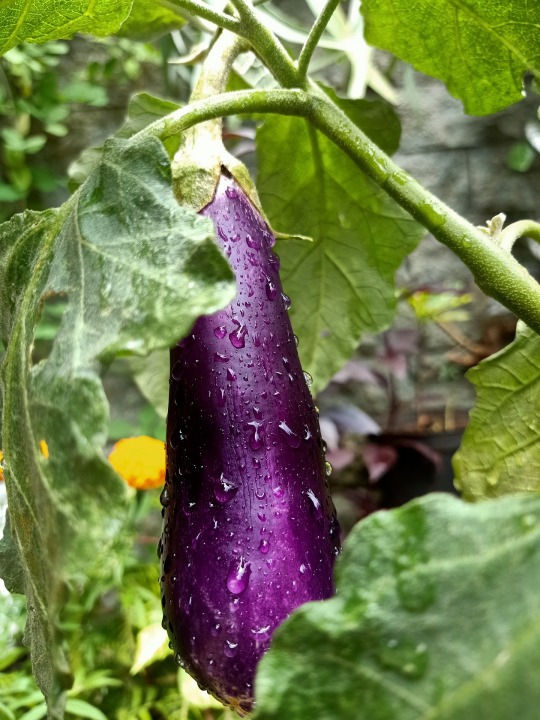
Aged chicken manure is a nutrient-rich organic fertilizer that provides a range of benefits for your eggplants.
READ MORE:
Boost Your Eggplant Harvest with Aged Chicken Manure
#gyo#gardening uk#gardenchat#organic gardening#gardening#backyard#vegetable gardening#lovegardening#gardening tips#garden#eggplant#organicgardening#gardeningtips#naturalfertilizer#growingvegetables#fertilizer#growyourownfood#growingveggies#vegetablegarden#vegetables#veggiepatch#growyourown#homegrown#greenthumb#mygarden#backyardgarden#growsomethinggreen#instagardenlovers#thehappygardeninglife#gardeninglife
17 notes
·
View notes